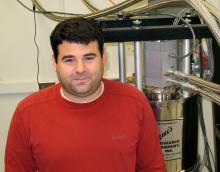
White House Announces that Two UCSB Faculty Members Will Receive U.S. Presidential Science Awards

President Obama today named two UC Santa Barbara faculty members as recipients of the Presidential Early Career Award for Scientists and Engineers (PECASE). The award is the highest honor the nation can bestow on a scientist or engineer at the beginning of his or her career.
Benjamin Mazin, assistant professor in the Department of Physics, and Sumita Pennathur, assistant professor in the Department of Mechanical Engineering, are among 94 individuals across the country to receive the early career awards, which recognize recipients' exceptional potential for leadership at the frontiers of scientific knowledge, and their commitment to community service, as demonstrated through scientific leadership, education, or community outreach.
The awards will be presented at a ceremony in Washington, D.C. on October 14.
"Our campus shares great pride in this prestigious recognition and in the innovative research of Assistant Professors Mazin and Pennathur," said UCSB Chancellor Henry T. Yang. "We look forward with anticipation to the exciting developments in their respective research programs in microwave kinetic inductance detectors and in nanofluidic transport and devices, and we wish them a joyous celebration at the White House."
Mazin was cited for outstanding contributions to the development of ultra-sensitive low-temperature detector arrays that provide energy resolution and arrival timing for photons from X-rays to the near-infrared.
Pennathur was recognized for outstanding research achievements in the fields of nanotechnology and mechanical engineering, which have provided new insights in the areas of nanofluidics and interfacial science, and have resulted in the development of novel theoretical and experimental platforms that enable breakthrough discoveries relating to protein transport, adsorption, and kinetics.
"With the PECASE awards the federal government recognizes the most outstanding scientists and engineers in the nation early in their careers," said Mike Witherell, vice chancellor for research at UCSB. "We are very pleased to have two of these national leaders here on our campus. We look forward to more breakthrough instruments developed by both Sumita and Ben."
Mazin said: "I am honored to receive the PECASE award. The breakthroughs in superconducting detectors my team is making have the potential to transform astronomy across the electromagnetic spectrum. I would like to thank NASA for the funding that has enabled this work, and look forward to continuing to develop innovative instrumentation for astrophysics."
In his research, Mazin uses a unique detector technology called microwave kinetic inductance detectors (MKIDs) for astronomy in the near infrared, optical, ultraviolet, and X-ray wavelengths. These detectors allow his research team to determine the energy and arrival time of individual photons. Mazin hopes to use this technology to detect Earth-like planets around nearby stars, as well as many general applications in astrophysics, such as untangling the emission mechanisms of pulsars. He received his B.S. in astronomy and physics, and mechanical engineering at Yale University in 1997. He completed his Ph.D. in astrophysics at the California Institute of Technology in 2004.
Pennathur said: "I am honored to be awarded a PECASE award to further my research in the development of a nanofluidic tool for protein transport and kinetic measurements. I would like to sincerely thank the combined support of the U.S. Army Research Office, and UCSB's Institute of Collaborative Biotechnologies, Department of Mechanical Engineering, and California NanoSystems Institute to make this dream possible."
Pennathur's research is focused on using fundamental fluidics knowledge at both microscale and nanoscale to create novel devices for practical applications. Major efforts include creating and developing enabling tools to identify and characterize biological substances, improving current bioanalytical devices, and designing entire systems for point-of-care usage. Pennathur received both her B.S. and M.S. in aerospace and aeronautical engineering from M.I.T., where she studied microscale cavitation in microelectromechanical systems. She received her Ph.D. in mechanical engineering at Stanford University in 2006, where she investigated electrokinetic transport of fluids at the nanoscale.
The PECASE awards were created to foster innovative developments in science and technology, increase awareness of careers in science and engineering, give recognition to the scientific missions of participating agencies, enhance connections between fundamental research and many of the grand challenges facing the nation, and highlight the importance of science and technology for America's future. Fourteen federal departments and agencies nominated scientists and engineers for the 2010 PECASE awards.
Related Links
Presidential Early Career Award for Scientists and Engineers



